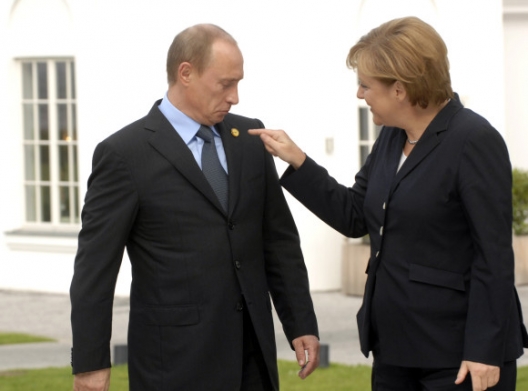 From Alison Smale, New York Times: Tit-for-tat expulsions of diplomats. Russian naval ships showing up as world leaders meet in Australia. Chancellor Angela Merkel of Germany telling Russia sternly to play by 21st-century rules — and President Vladimir V. Putin practically spitting fury over Western reaction to his annexation of Crimea. . . .
From Alison Smale, New York Times: Tit-for-tat expulsions of diplomats. Russian naval ships showing up as world leaders meet in Australia. Chancellor Angela Merkel of Germany telling Russia sternly to play by 21st-century rules — and President Vladimir V. Putin practically spitting fury over Western reaction to his annexation of Crimea. . . .
“The Ukraine crisis is most likely not just a regional problem,” Ms. Merkel said in a speech at the Lowy Institute for International Policy in Sydney, Australia. “In this case, we see it affects us all.”
“Who would’ve thought,” she said, “that 25 years after the fall of the wall, after the end of the Cold War, after the end of the division of Europe and the end of the world being divided in two, something like that can happen right at heart of Europe?”
Ms. Merkel’s speech followed a meeting of the Group of 20 leaders in Brisbane, Australia, where the souring relations were on full display as Western leaders pressed Mr. Putin on Russia’s Crimea policy and support for Ukrainian separatists — and the Russian leader slipped out early, insisting he had business to attend to back home. . . .
Ms. Merkel seemed to acknowledge that the West should consider Russian sensitivities to Ukraine — with long, close ties to Russia — joining NATO. But she said that was not the case with Ukraine drawing closer to the European Union, which sparked the long-running unrest and conflict with Russia.
In such a case, “it cannot be that you forbid a country to act, or that it cannot itself decide freely,” she said. “Otherwise, we have to say: ‘We’re so weak, pay attention, people, we can’t take any more members — we’ll just ask in Moscow whether it’s possible.’ That was how it was for 40 years, or longer, and I really was not wanting to go back there.”
“And it is not just a case of Ukraine,” Ms. Merkel continued. “It concerns Moldova, it concerns Georgia. If things go on like this, one can ask: Should we ask about Serbia? Should we ask about the western Balkans? That is certainly incompatible with our values. . . .”
“Let me put it bluntly: This is a war,” [Ukraine’s prime minister, Arseniy] Yatsenyuk said. “The well-known diplomatic language of red line is sometimes embarrassing to me because it seems as if we are geopolitically colorblind. Russia has crossed tens of red lines. . . .”
But the fourth element in Ms. Merkel’s description of Western reaction to Ukraine was crucial: to refrain from military action against Russia, which, she noted, would almost certainly not be limited to the region. That perhaps is the strongest Cold War echo of all — the idea that a confrontation in one area would lead to a much bigger conflict.
From Deutsche Welle: The DPA news agency said German Chancellor Merkel visited Putin’s Brisbane hotel and spent nearly six hours in a small conference room on Saturday at unscheduled, closed-door talks reported to have focused on Ukraine.
DPA reported that her one-to-one talks with Putin lasted for two hours before they were joined by European Commission President Jean-Claude Juncker. The three-way talks then ran for around four hours.
[President of the European Council Herman] Van Rompuy said EU leaders at Sunday’s G20 session intended to consult with US President Barack Obama, who was also in Brisbane. He called on Putin to halt alleged weapons deliveries.
Image: Russian President Vladimir Putin and German Chancellor Angela Merkel, June 6, 2007 (photo: Kuhler/German Government)
